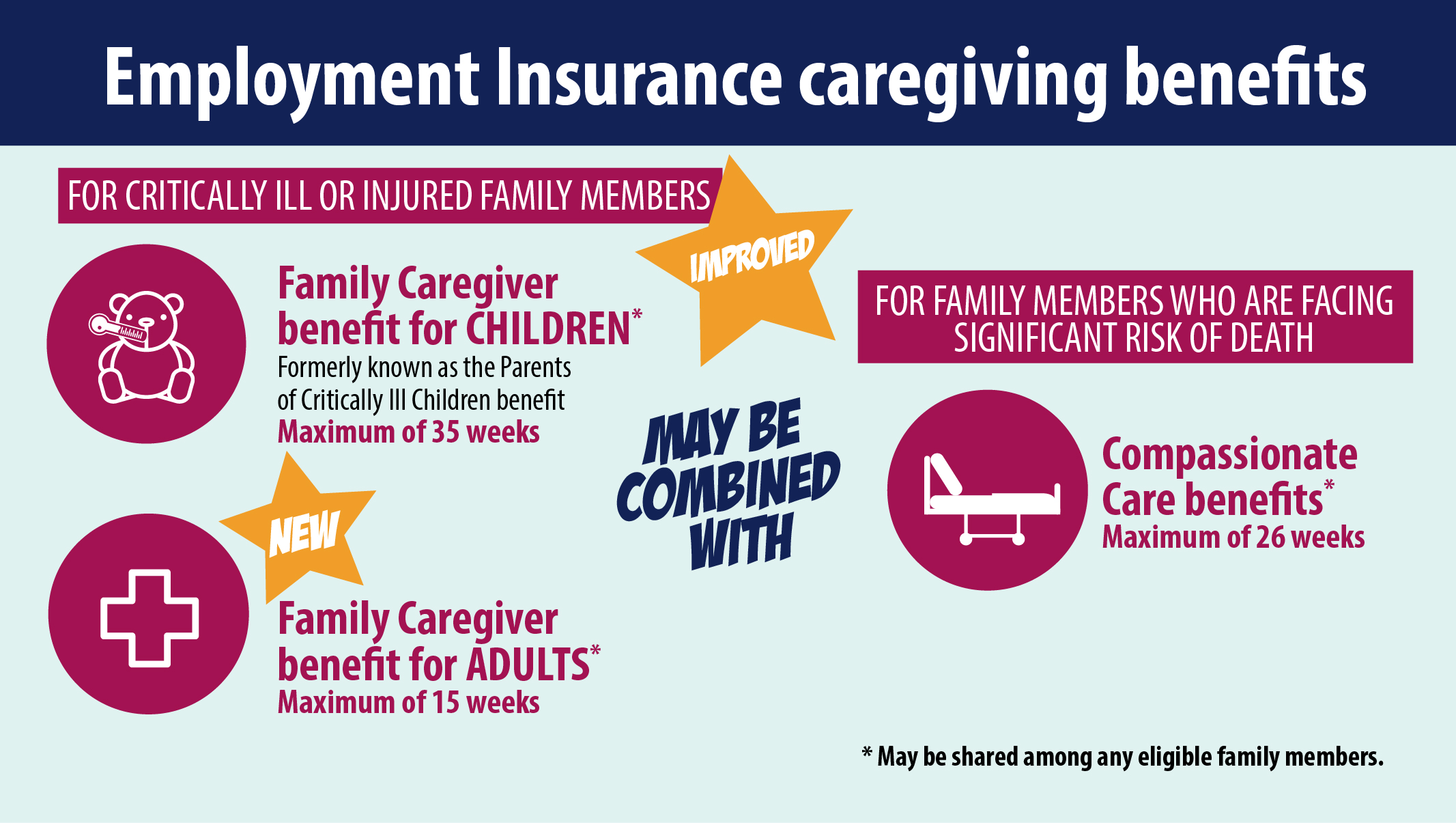Introducing a new EI Family Caregiver benefit
Since December 3, 2017, the new Family Caregiver benefit for adults is available to help families care for a critically ill adult. This benefit allows eligible caregivers to take up to 15 weeks off work to care for or support an adult family member who is critically ill or injured. Eligible caregivers are family members or individuals that the critically ill or injured adult considers to be like family.
To access the new Family Caregiver benefit for adults, a family member must submit a medical certificate signed by a medical doctor or nurse practitioner saying that:
- there has been a significant change in the patient’s baseline state of health;
- the patient’s life is at risk as a result of an illness or injury; and
- the patient requires the care or psychological or emotional support of one or more family members.
This new 15-week Family Caregiver benefit may be shared by eligible family members over a one-year period.
For more information or to apply, visit Family caregiver benefit for adults - what caregiving benefits offer.

Caregivers can share the benefit at the same time or one after another.
If the family member’s health gets worse, caregivers could be eligible to combine this new caregiving benefit with the existing Compassionate Care benefits, which provides a maximum of 26 weeks of benefits.

ExamplesFootnote 1
- Example 1: One family member providing care to a critically ill adult
- Example 2: Two family members providing care to a critically ill adult
- Example 3: Combining the new 15-week caregiving benefit with the Compassionate Care benefit
Example 1
Emilio has a stroke. He lives alone and needs care during his recovery. Emilio’s medical doctor completes the medical certificate stating that he is critically ill and requires the care or support of a family member.
Emilio’s son Hector takes time off work to care for his father and make sure he gets to his medical appointments.
Hector is eligible for EI and earns $30,000 per year. He takes 16 weeks off work to care for his father. After the one-week waiting period, Hector can receive the Family Caregiver benefit for adults for up to 15 weeks. He will receive $317 per week for a total of $4,755.
Example 2
Julie is in a car accident and suffers life-threatening injuries. She undergoes surgery and is admitted to the intensive care unit of the hospital. Julie’s medical doctor completes the medical certificate stating that she is critically ill and requires the care or support of a family member. Doctors have told her family that they expect her to recover within four months.
Julie’s husband Patrick and her sister Sylvie plan to take time off work to support her while she is in the hospital and when she recovers at home. Patrick and Sylvie are both eligible for EI and can share the 15-week Family Caregiver benefit for adults.
Patrick earns $50,000 per year and takes 4 weeks off work immediately after the accident. After the one-week waiting period, Patrick receives the Family Caregiver benefit for adults of $529 per week for 3 weeks, for a total of $1,587.
Sylvie applies to receive 12 weeks of the Family Caregiver benefit for adults without a waiting period. She earns $40,000 per year, so her weekly benefit is $423. In total, she receives $5,076 over 12 weeks.
Example 3
Paul’s partner David has been diagnosed with cancer. Paul takes times off work to care for him at home.
David’s medical doctor completes the medical certificate stating that he is critically ill and requires the care or support of a family member. Paul is eligible for EI and applies for the Family Caregiver benefit for adults. He earns $60,000 per year.
He receives the maximum EI benefit of $547 per week for 15 weeks. In total, Paul receives $8,205.
Unfortunately, David’s treatments are not successful and doctors expect he will not live more than six months. Paul gets the medical certificate required to claim 26 weeks of Compassionate Care benefits.
He receives $547 per week in Compassionate Care benefits. In total, he receives $14,222 over 26 weeks.
Altogether, Paul receives $22,427 from Family Caregiver benefits and Compassionate Care benefits.
Page details
- Date modified: